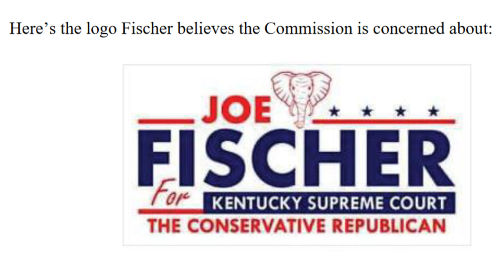6th Circuit blocks ethics probe of judicial candidates who touted GOP links, anti-abortion endorsements

Republican Joseph Fischer’s logo identifies himself as "the conservative Republican" and shows the face of an elephant. Image from the 6th U.S. Circuit Court of Appeals' Oct. 28 opinion.
A federal appeals court has blocked the Kentucky Judicial Conduct Commission from investigating two judicial candidates accused by citizens of touting their Republican background and their endorsements from anti-abortion groups.
The 6th U.S. Circuit Court of Appeals at Cincinnati granted an injunction pending appeal Oct. 28 in a lawsuit by Kentucky judicial candidates Joseph Fischer and Robert A. Winter Jr. Fischer is running for the state supreme court, and Winter is running for the state court of appeals.
The 6th Circuit said the preliminary ethics investigation chills the candidates’ First Amendment rights, and they had shown a likelihood of success in their suit for injunctive and declaratory relief.
Fischer’s logo identifies himself as “the conservative Republican” and shows the face of an elephant. Winter also claims to be conservative and Republican. But neither claims to be the Republican nominee, and neither uses the Republican elephant logo.
The candidates also received endorsements from various anti-abortion groups and used them in their campaigns, according to an appeals brief cited by the Louisville Courier Journal via Yahoo.
The Kentucky Judicial Conduct Commission had asked Fischer and Winter to respond to ethics complaints filed by members of the public regarding their campaign statements. The commission also asked the candidates to attend an informal conference to discuss the allegations.
The individuals had claimed violations of judicial ethics rules that bar campaign activity inconsistent with judicial independence, that bar candidate pledges on cases likely to come before the court, that bar candidates from publicly identifying themselves as nominees of a political organization, and that ban candidates from seeking or using endorsements from a political organization.
The commission had not addressed the candidates’ First Amendment arguments, instead seeking a remand for consideration of the issue. Nor had it identified the specific comments by the candidates that triggered the investigation.
As a result, the 6th Circuit said, “the candidates are left wondering what speech crossed the line. … Forced to guess in the heat of an election, a candidate will censor much more speech than necessary.”
The candidates nonetheless offered several possibilities of speech targeted by the commission, including their self-identification as Republican and conservative and their use of endorsements by anti-abortion organizations Kentucky Right to Life and Northern Kentucky Right to Life.
The 6th Circuit concluded that the First Amendment protects those statements.
Candidates have a constitutional right to portray themselves as members of a political party, the 6th Circuit said. The elephant face also posed no problem.
“Simply put,” the 6th Circuit said, “the First Amendment doesn’t allow the commission to ban animal symbols just because they happen to be closely associated with political parties.”
In addition, there is no obligation to disavow endorsements by anti-abortion groups, the 6th Circuit said, and the candidates can use them in their campaigns.
The commission had argued that Fischer and Winter didn’t have standing because they hadn’t shown a credible threat of enforcement that chills speech. The 6th Circuit ruled for the candidates on that issue, finding that they are “self-censoring because the vague threats from the commission could apply to a wide range of campaign-related speech.”
The 6th Circuit noted several factors supporting a threat of enforcement:
• The commission investigated Winter for similar conduct in 2014.
• The commission had sent letters to Fischer and Winter warning that it had launched a preliminary investigation.
• An enforcement threat is easier because any member of the public is allowed to file complaints, including political opponents with incentives to file frivolous complaints on the eve of an election. This provision now has “more teeth” because the commission notifies candidates of a preliminary probe when it thinks that there is a basis to investigate, without the need for a probable cause finding at that stage.
• The commission refused to disavow enforcement of the relevant judicial code provisions.
The case is Fischer v. Thomas.
The authors of the opinion are Judges Amul Thapar and Eric Murphy, who are appointees of former President Donald Trump. Judge Richard Griffin, an appointee of former President George W. Bush, dissented on the issue of standing.
Publications covering the ruling include Law360 and the Louisville Courier Journal via Yahoo.



